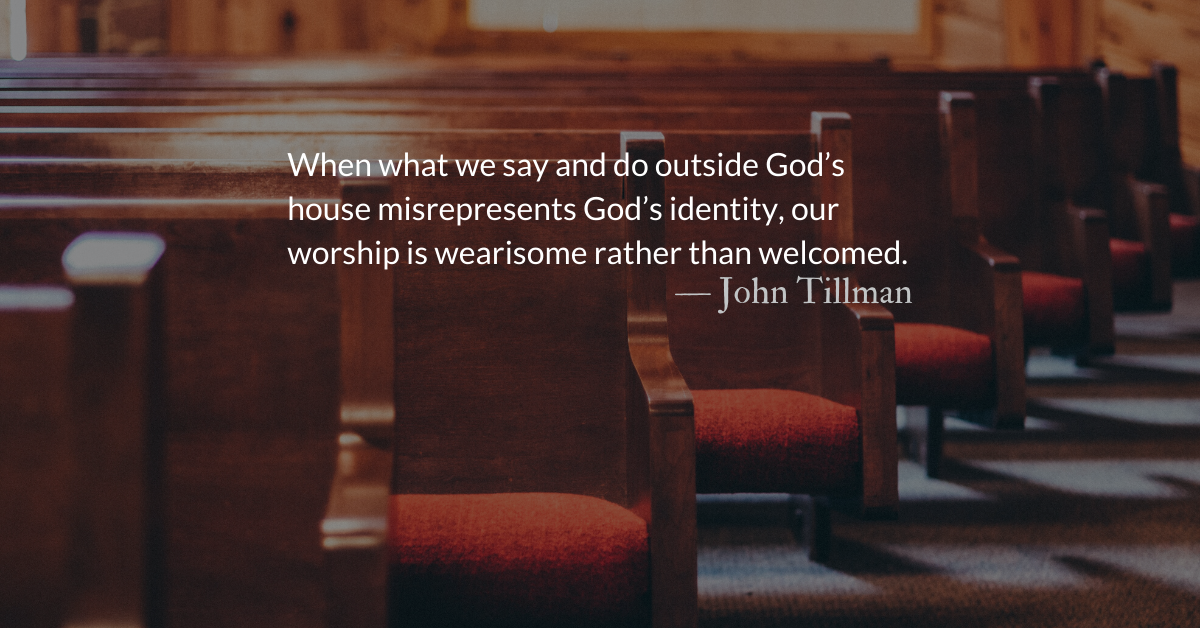Scripture Focus: Isaiah 1.12-15
12 When you come to appear before me,
who has asked this of you,
this trampling of my courts?
13 Stop bringing meaningless offerings!
Your incense is detestable to me.
New Moons, Sabbaths and convocations—
I cannot bear your worthless assemblies.
14 Your New Moon feasts and your appointed festivals
I hate with all my being.
They have become a burden to me;
I am weary of bearing them.
15 When you spread out your hands in prayer,
I hide my eyes from you;
even when you offer many prayers,
I am not listening.
Reflection: A Worn Out Welcome
By John Tillman
When we go into the house of the Lord, is God glad we have come?
Much of Isaiah’s first chapter concerns how the worshipers in Judah had worn out their welcome in God’s house. God was actually weary of putting up with the very acts these worshipers thought were pleasing to God.
To hear Isaiah’s words, one might assume that these were bad times in Judah. Far from it. All external indicators looked good, but the spiritual reality was quite different.
Many churches are considering plans to return to worshiping in their sanctuaries as bans on gatherings are relaxed. But before we start singing, “I was glad when they said unto me, let us go into the house of the Lord,” perhaps we need to consider Isaiah’s warnings to a prosperous and crowded Temple.
How can we tell if we have worn out our welcome in God’s house? Let’s look at the commands and warnings God gives through Isaiah. (Isaiah 1.16-17)
Are you “clean?”
“Your hands are full of blood!” (Isaiah 1.15)
This is figurative blood of the suffering these worshipers are responsible for. Are your accounts lined with profit from taking advantage of the poor? Is your security more important than others’ oppression? Are you deaf to suffering? Are you hard-hearted? Are you close-handed with those in need?
Will you repent?
“…stop doing wrong. Learn to do right…” (Isaiah 1.14-15)
To stop doing wrong you must learn to do what is right. You cannot repent of what you claim is not sin.
Will you seek righteousness?
“…seek justice.” (Isaiah 1.15)
Do not misconstrue righteousness as forcing others to live in obedience. Righteousness means surrendering your own sinful nature to be killed and replaced with Christ’s righteousness.
Who will you defend?
“Take up the cause of the fatherless; plead the case of the widow.” (Isaiah 1.15)
Will you take up the cause of the oppressed, the fatherless, the widow? Will you expand your definition of the oppressed to include not only the oppressed people you are comfortable with, but the ones who make you uncomfortable?
Who will you correct?
“Defend the oppressed.” (Isaiah 1.15)
“Defend the oppressed” can also be translated as “correct the oppressor.” Will you confront the powerful? And not just powerful enemies? Will you confront powerful friends, as Nathan confronted David?
When what we say and do outside God’s house misrepresents God’s identity, our worship is wearisome rather than welcomed. As Jesus says, “Why do you call me, ‘Lord, Lord,’ but not do what I say.”
Divine Hours Prayer: The Refrain for the Morning Lessons
Let the words of my mouth and the meditation of my heart be acceptable in your sight, O Lord, my strength and my redeemer. — Psalm 19.14
– Divine Hours prayers from The Divine Hours: Prayers for Springtime by Phyllis TickleToday’s Readings
Isaiah 1 (Listen – 4:36)
Hebrews 9 (Listen 4:40)
Read more about Confession as a Crucible
The crucible of COVID-19 is revealing in our society and ourselves the ugliest most sinful parts of our nature.
Read more about Humble, Welcoming Servants
Help us to be servants to all-comers, not contestants against all-comers.







